An analysis from The Associated Press demonstrates that, since 2022, there have been more than 100 instances where pregnant people in medical distress, who sought help from hospitals and emergency rooms across the country, were turned away from treatment or treated negligently.
The year the analysis starts from is significant, as the Supreme Court overturned Roe v. Wade in the middle of 2022, ending federal abortion rights protections that had been in place for nearly half a century. Most of the life-threatening situations within the analysis could have been solved by providing a person with an abortion, rather than subjecting them to harrowing conditions.
The figure is possibly higher than 100 individuals detrimentally affected, as the analysis only includes documented cases of negligence and refusal of service for dozens of people — many more unreported instances could very well exist.
According to the analysis, people who were experiencing complications with their pregnancies suffered life-threatening issues, such as going into septic shock after their fetus had died or after being refused treatment for ectopic pregnancies by their physicians. The analysis also documented instances where pregnant people were forced to miscarry in public restrooms rather than under the supervision of medical professionals.
The patients “were turned away or sent home while in active labor, bleeding or leaking amniotic fluid,” said Amanda Seitz, the author of The Associated Press article that detailed the analysis.
The analysis noted that states with anti-abortion laws weren’t the only ones with questionable records. One documented case occurred in California, a state that purports to be an abortion sanctuary, when a pregnant woman required a blood transfusion after waiting for several hours in the ER to be treated for her ectopic pregnancy.
The Biden administration has issued guidance that requires federally funded hospitals to provide an abortion when it is required to save a person’s life. However, doctors and physicians in several states are reluctant to do so due to fears of being prosecuted by state agencies under vague laws that do not define what a life-saving situation is. Texas is also challenging that federal guideline.
Abortion rights advocates believe that these states’ physicians need to be more proactive in determining who is eligible for an abortion under these standards.
“As fearful as hospitals and doctors are of running afoul of these state abortion bans, they also need to be concerned about running afoul of federal law,” said Marc Hearron, attorney for the Center for Reproductive Rights.
Strict abortion bans, such as those in Texas, harm pregnant people, including those who want to give birth because the exceptions to the bans, which in theory give consideration to people who face life-threatening situations, are so vague that doctors don’t dare test the waters for fear of prosecution. These exceptions are so vague, they are “virtually meaningless,” said Sonia Suter, a law professor at Washington University, speaking to openDemocracy about the issue earlier this year.
“What’s the magnitude of the risk that the law requires? What’s the probability of harm? How imminent must it be?” Suter questioned, adding:
The vagueness of these laws is a feature, not a bug. The vague exceptions allow a layperson to say ‘oh, the state cares about women’. But the state doesn’t care.
Trump is busy getting ready for Day One of his presidency – but so is Truthout.
Trump has made it no secret that he is planning a demolition-style attack on both specific communities and democracy as a whole, beginning on his first day in office. With over 25 executive orders and directives queued up for January 20, he’s promised to “launch the largest deportation program in American history,” roll back anti-discrimination protections for transgender students, and implement a “drill, drill, drill” approach to ramp up oil and gas extraction.
Organizations like Truthout are also being threatened by legislation like HR 9495, the “nonprofit killer bill” that would allow the Treasury Secretary to declare any nonprofit a “terrorist-supporting organization” and strip its tax-exempt status without due process. Progressive media like Truthout that has courageously focused on reporting on Israel’s genocide in Gaza are in the bill’s crosshairs.
As journalists, we have a responsibility to look at hard realities and communicate them to you. We hope that you, like us, can use this information to prepare for what’s to come.
And if you feel uncertain about what to do in the face of a second Trump administration, we invite you to be an indispensable part of Truthout’s preparations.
In addition to covering the widespread onslaught of draconian policy, we’re shoring up our resources for what might come next for progressive media: bad-faith lawsuits from far-right ghouls, legislation that seeks to strip us of our ability to receive tax-deductible donations, and further throttling of our reach on social media platforms owned by Trump’s sycophants.
We’re preparing right now for Trump’s Day One: building a brave coalition of movement media; reaching out to the activists, academics, and thinkers we trust to shine a light on the inner workings of authoritarianism; and planning to use journalism as a tool to equip movements to protect the people, lands, and principles most vulnerable to Trump’s destruction.
We urgently need your help to prepare. As you know, our December fundraiser is our most important of the year and will determine the scale of work we’ll be able to do in 2025. We’ve set two goals: to raise $150,000 in one-time donations and to add 1,500 new monthly donors.
Today, we’re asking all of our readers to start a monthly donation or make a one-time donation – as a commitment to stand with us on day one of Trump’s presidency, and every day after that, as we produce journalism that combats authoritarianism, censorship, injustice, and misinformation. You’re an essential part of our future – please join the movement by making a tax-deductible donation today.
If you have the means to make a substantial gift, please dig deep during this critical time!
With gratitude and resolve,
Maya, Negin, Saima, and Ziggy
